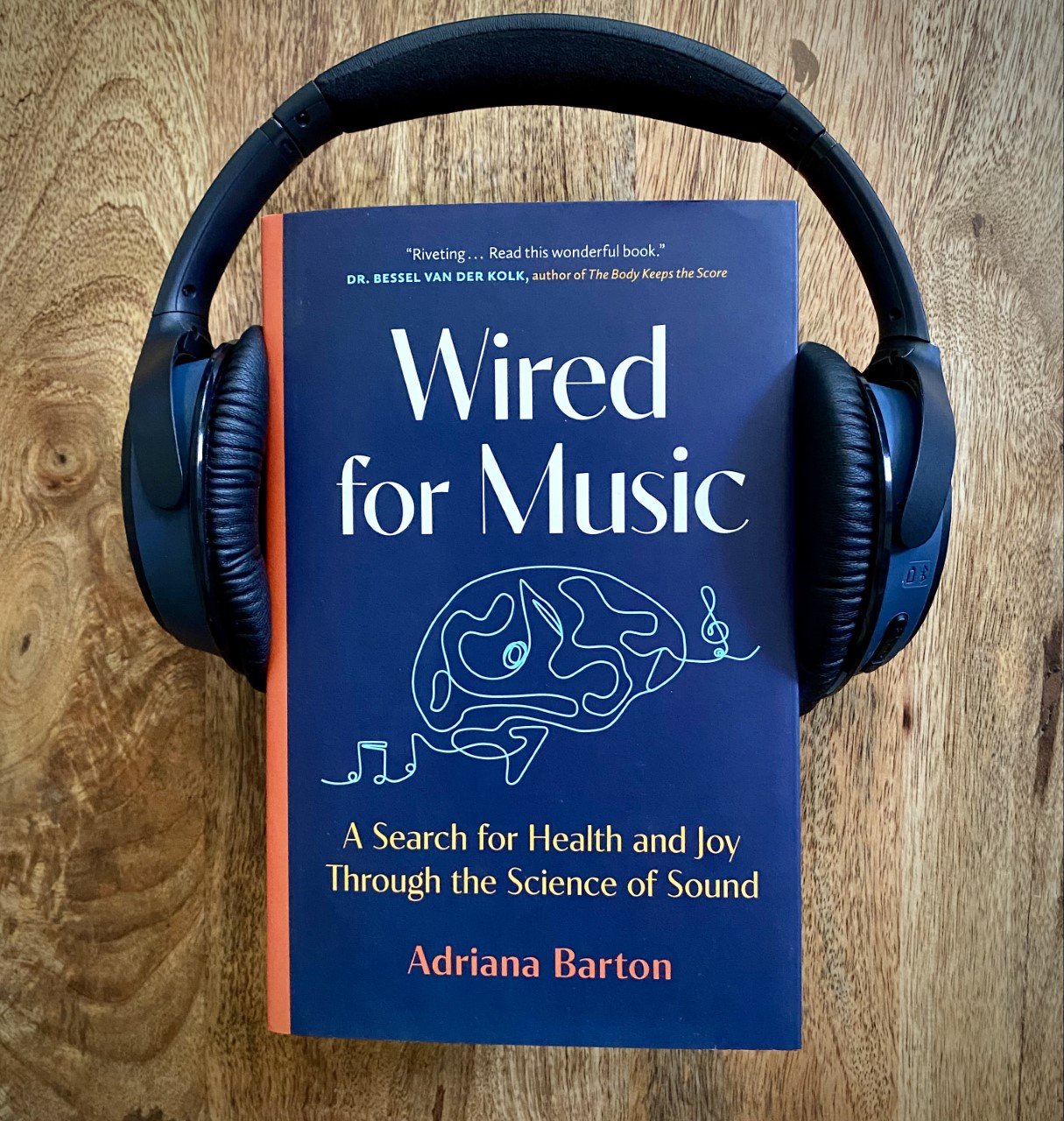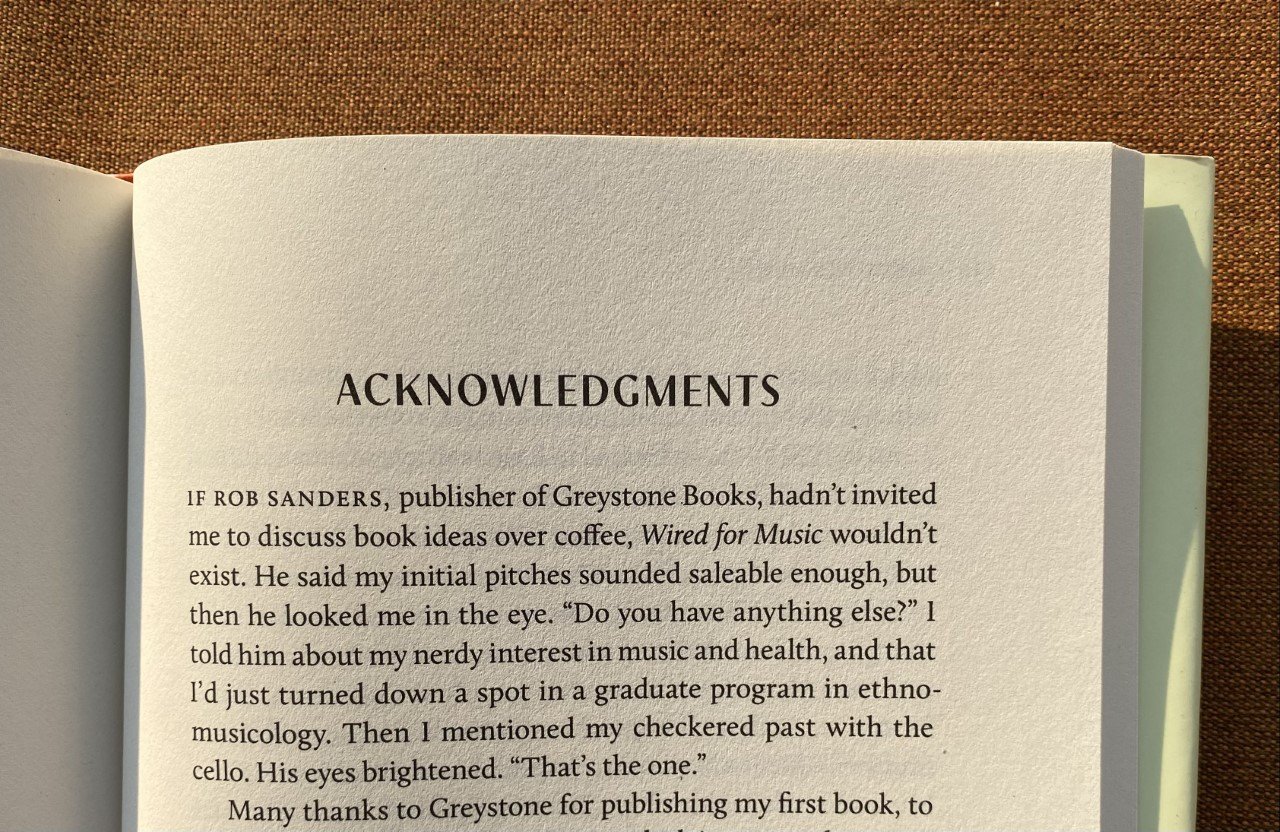Editing my first book took so much time that I didn’t give the audiobook a moment’s thought until Wired for Music was sent to the printer.
Weeks later, I spent more than 30 hours in a recording studio narrating my science memoir. Fortunately, my publisher handled all dealings with the production company, but I had to learn how to narrate on the fly.
Here are seven things about audiobooks that authors need to know:
First day in the studio recording the audiobook version of Wired for Music; check out the giant mic and the screen scrolling the text
Don’t assume you’ll be the narrator.
Even if listeners say they prefer audiobooks narrated by the author, this preference does not apply to authors with an erratic reading pace or a monotonous voice.
Writing and narrating are very different skills — and in standard book deals, publishers buy the rights to produce (and profit from) the audiobook edition. Several authors have told me their publisher turned down their offer to narrate their own book.
I had to submit an “audition tape” to narrate mine. Using an iPhone, I recorded myself for five minutes of nonstop reading, trying to get the nuances and pacing right. (Not as easy as it sounds.)
Although my audition landed me the part, I was told to speed up my reading in the studio — I had overcorrected my fast talking pace.
It helps to listen — and read up.
To get a sense of what works and what doesn’t, I downloaded highly rated audiobooks by author-narrators such as Brené Brown (Atlas of the Heart) and James Clear (Atomic Habits). Then I listened to previews of audiobooks described by reviewers as “boring” or “annoying.” (In most cases, I had to agree.)
For practical tips, I read this article in the Guardian and this one by my former Globe and Mail colleague Marsha Lederman (author of Kiss the Red Stairs).
I learned that audiobook producers often have a director to guide the narrator (mine did not). And that voiceover artists recommend eating apples at break times and drinking hot liquids with lemon to soothe the throat. Some even spritz their throat with Chloraseptic (mine got scratchy, but never that sore).
In the studio, there’s a lot going on.
Reading from a brightly lit screen, I could hear my own voice streaming through the headphones simultaneously — along with the clicking and tapping of controls from the sound engineer in the adjacent booth.
As the pages scrolled down, I tried to anticipate how I would read each line and scan ahead for a complex sentence or tricky word. (Tip: Look up less familiar words and place names in advance on a site such as YouGlish, a handy pronunciation tool.)
The mic picks up everything.
The rustling of clothing. Stomach gurgles. A subtle shift in weight from one foot to the other. I got in the habit of wearing “low noise” clothing (leggings and a soft sweater) and eating at least an hour beforehand to keep hunger and digestive noises at bay.
You become hyper-aware of your writing choices.
I didn’t want my science memoir to be a slog to read, so I kept chiseling and chiseling at the sentence level. All that editing was a huge advantage at the audiobook stage, as I rarely found myself stumbling over my own syntax or regretting a long, back-ended sentence that didn’t flow from the previous idea.
(Many thanks to my stellar book coach, Marial Shea, who encouraged me to read early drafts to her over the phone.)
Narrating is a lot like acting.
I discovered that action verbs such as “struggled” or “pummeled” sound better if you draw them out. To make the science passages sound more like a story, I sped up in places to show my excitement in the material and slowed down in others to let a big idea sink in.
For words in quotations, I altered my voice slightly to cue the listener that they came from a different source. In memoir passages, I tried to picture the scene and remember the emotions I felt, allowing these feelings to leak into my voice.
The job is tiring, but rewarding.
For inexperienced narrators like me, audio studios budget about three hours of recording for every finished hour (my audiobook is about 9.5 hours long). Even with breaks, it takes a lot of focus to read with expression for three- to four-hour sessions, standing all the while. (Some studios give narrators the option of sitting, but standing helps keep the diaphragm open.)
To my surprise, I was not given the opportunity to listen to the full audiobook before the final edits. (I assume this is standard practice to avoid unnecessary retakes, especially with first-time narrators, who may not like the sound of their own voice.)
Even so, I enjoyed the experience. Narrating allowed me to express the thoughts I’d written in my own voice and convey the right tone for musical and scientific terms, as well as non-English words in travel scenes. I’m not sure a professional narrator would have understood their significance in the same way.
The hourly wage was a bonus, too: A typical narrator’s fee ranges from $120 per edited hour of audiobook to more than $200.
Wired for Music is available as a hardcover, e-book and audiobook (paperback to be released in Fall 2023)
My brief role as a narrator piqued my interest in the runaway popularity of audiobooks (mine is available wherever audiobooks are sold).
In 2021, audiobook sales reached $4.2-billion U.S., with a predicted growth rate of 26.5 per cent by 2030. Meanwhile, sales of print books are expected to decline or remain flat.
But as conveyers of ideas, how do the two formats stack up?
Freelance writer Markham Heid probed this question in an article for Time magazine.
Compared to audiobook listeners, he reported, book readers tend to consume information faster and retain more of it. They also save money, since paper and e-books generally cost less than audiobooks.
But audiobooks are better for multitasking — you can listen while flipping burgers or on a daily commute. And audiobook fans describe the format as a more intimate experience, especially if the author is narrating.
I’m not about to quit writing to become a full-time narrator, but this review of my audiobook made the effort feel worthwhile:
Wired for Music was moving, enlightening and somehow comforting as well. It was a wonderful weaving of personal story and science read beautifully by the author, Adriana Barton, who has a lovely voice!
Years of reading to my child must have helped. (We kept up the habit until he turned 12.)
To other authors, especially those who enjoy reading out loud, I highly recommend narrating your audiobook if you get the chance.


